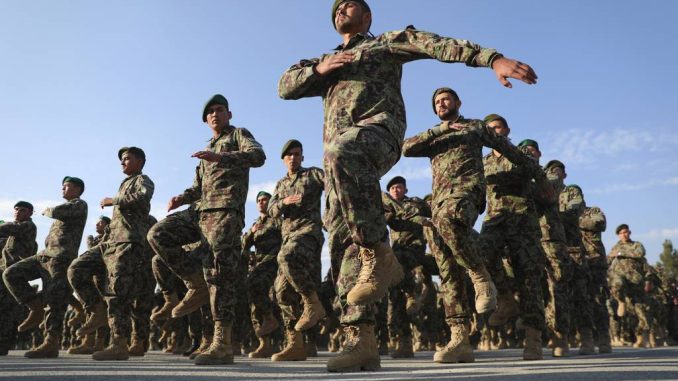
The United Nations has received “credible allegations” that more than 100 former members of the Afghan government, its security forces and those who worked with international troops have been killed since the Taliban took over the country Aug. 15, Secretary-General Antonio Guterres says.
In a report obtained Sunday by The Associated Press, Guterres said that “more than two-thirds” of the victims were alleged to result from extrajudicial killings by the Taliban or its affiliates, despite the Taliban’s announcement of “general amnesties” for those affiliated with the former government and U.S.-led coalition forces.
The U.N. political mission in Afghanistan also received “credible allegations of extrajudicial killings of at least 50 individuals suspected of affiliation with ISIL-KP,” the Islamic State extremist group operating in Afghanistan, Guterres said in the report to U.N. Security Council.
He added that despite Taliban assurances, the U.N. political mission has also received credible allegations “of enforced disappearances and other violations impacting the right to life and physical integrity” of former government and coalition members.
Guterres said human rights defenders and media workers also continue “to come under attack, intimidation, harassment, arbitrary arrest, ill-treatment and killings.”
Eight civil society activists were killed, including three by the Taliban and three by Islamic State extremists, and 10 were subjected to temporary arrests, beatings and threats by the Taliban, he said. Two journalists were killed — one by IS — and two were injured by unknown armed men.
The secretary-general said the U.N. missions documented 44 cases of temporary arrests, beatings and threats of intimidation, 42 of them by the Taliban.
RELATED
:quality(70)/cloudfront-us-east-1.images.arcpublishing.com/mco/BMNSR62ADJG65G5FBKOMGIZITA.jpg)
The Taliban overran most of Afghanistan as U.S. and NATO forces were in the final stages of their chaotic withdrawal from the country after 20 years. They entered Kabul on Aug. 15 without any resistance from the Afghan army or the country’s president, Ashraf Ghani, who fled.
The Taliban initially promised a general amnesty for those linked to the former government and international forces, and tolerance and inclusiveness toward women and ethnic minorities. However, the Taliban have renewed restrictions on women and appointed an all-male government, which have met with dismay by the international community.
Afghanistan’s aid-dependent economy was already stumbling when the Taliban seized power, and the international community froze Afghanistan’s assets abroad and halted economic support, recalling the Taliban’s reputation for brutality during its 1996-2001 rule and refusal to educate girls and allow women to work.
Guterres said: “The situation in Afghanistan remains precarious and uncertain six months after the Taliban takeover as the multiple political, socio-economic and humanitarian shocks reverberate across the country.”
He said Afghanistan today faces multiple crises: a growing humanitarian emergency, a massive economic contraction, the crippling of its banking and financial systems, the worst drought in 27 years, and the Taliban’s failure to form an inclusive government and restore the rights of girls to education and women to work.
“An estimated 22.8 million people are projected to be in `crisis’ and `emergency’ levels of food insecurity until March 2022,” the U.N. chief said. “Almost 9 million of these will be at `emergency’ levels of food insecurity -– the highest number in the world. Half of all children under five are facing acute malnutrition.”
On a positive note, Guterres reported “a significant decline” in the overall number of conflict-related security incidents as well as civilian casualties since the Taliban takeover. The U.N. recorded 985 security-related incidents between Aug. 19 and Dec. 31, a 91% decrease compared to the same period in 2020, he said.
The eastern, central, southern and western regions accounted for 75% of all recorded incidents, he said, with Nangarhar, Kabul, Kunar and Kandahar ranking as the most conflict-affected provinces.
RELATED
:quality(70)/cloudfront-us-east-1.images.arcpublishing.com/mco/YUBSK5OQ5RGBZLO44L2XZIVN5Y.jpg)
Despite the reduction in violence, Guterres said the Taliban face several challenges, including rising attacks against their members.
“Some are attributed to the National Resistance Front comprising some Afghan opposition figures, and those associated with the former government,” he said. “These groups have been primarily operating in Panjshir Province and Baghlan’s Andarab District but have not made significant territorial inroads” though “armed clashes are regularly documented, along with forced displacement and communication outages.”
Guterres said intra-Taliban tensions along ethnic lines and competition over jobs have also resulted in violence, pointing to armed clashes on Nov. 4 between between Taliban forces in Bamyan city.
In the report, the secretary-general proposed priorities for the U.N. political mission in the current environment, urged international support to prevent widespread hunger and the country’s economic collapse, and urged the Taliban to guarantee women’s rights and human rights.


Be the first to comment